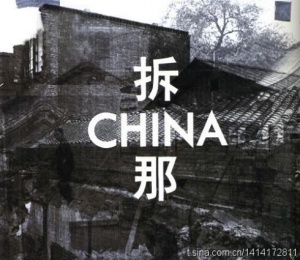“Demolish it”的版本间的差异
来自China Digital Space
小 (文本替换 - 替换“Category”为“分类”) |
|||
| (未显示5个用户的32个中间版本) | |||
| 第1行: | 第1行: | ||
| − | 拆哪 (chāi nǎ) demolish it | + | '''拆哪 (chāi nǎ): demolish it''' |
| − | + | [[File:chaina.jpg|300px|thumb|right|''(Source unknown)'']] | |
| + | [[File:demolishit2.jpg|300px|thumb|right|''Bulldozer with "demolish" written on it, an extension of the bureaucratic arm. (Source: [http://www.ycwb.com/ ycwb.com])]]Homophone of the English word "China," referring to the character for "demolish" (拆 chāi), a ubiquitous site on buildings slated for destruction. | ||
| − | + | Demolition has a special meaning in contemporary China, as demolitions, often forced on tenants with little or no compensation, are a major source of social instability. Developers and the local government profit greatly from [http://chinadigitaltimes.net/2012/02/scenes-from-a-forced-demolition/ forcibly evicting] people from their homes to build on the land. Anger over forced demolitions led the people of [http://chinadigitaltimes.net/china/wukan/ Wukan], Guangdong to fight the local government, eventually laying siege to their village in December 2011. | |
| − | + | 哪 nǎ means "where" or "which." Hence, ''chai na'' also sounds like the question "Where/which to demolish?" mocking the ubiquity of demolition. | |
| − | + | Throughout China, "demolish" is spray-painted or stenciled on the sides of buildings slated for demolition. People who have had their homes demolished are called 拆迁户 (chāiqiānhù). | |
| − | [ | + | ''Chai na'' is included in Linguist [http://languagelog.ldc.upenn.edu/nll/?p=4026 Victor Mair's collection of nicknames for China]. |
| − | + | Examples: | |
| − | + | <blockquote>''Yetan'' (@叶檀): The newly built housings are garbage and will have to be demolished after becoming ghettos. "Demolishing" will boost GDP. If we want our buildings to last a hundred years, we need to firstly, rely on good planning and secondly, rely on the quality of the architecture. The government didn't do its part, and now there is no use in issuing an administrative order to not demolish anymore. (September 26, 2014)</blockquote> | |
| − | [[ | + | <blockquote>建成的新房就是垃圾,住成贫民窟,只能拆哪,拆了增加GDP。想有百年建筑,一靠规划,二靠建筑质量,政府该做的没做好,现在下行政不拆命令,没用。 [[https://freeweibo.com/weibo/%40%E5%8F%B6%E6%AA%80 '''Chinese''']]</blockquote> |
| − | [[ | + | [[分类:Lexicon]][[分类:Society and Culture]] |
| − | ]] | ||
| − | |||
| − | [[ | ||
2023年8月7日 (一) 05:01的最新版本
拆哪 (chāi nǎ): demolish it

Homophone of the English word "China," referring to the character for "demolish" (拆 chāi), a ubiquitous site on buildings slated for destruction.
Demolition has a special meaning in contemporary China, as demolitions, often forced on tenants with little or no compensation, are a major source of social instability. Developers and the local government profit greatly from forcibly evicting people from their homes to build on the land. Anger over forced demolitions led the people of Wukan, Guangdong to fight the local government, eventually laying siege to their village in December 2011.
哪 nǎ means "where" or "which." Hence, chai na also sounds like the question "Where/which to demolish?" mocking the ubiquity of demolition.
Throughout China, "demolish" is spray-painted or stenciled on the sides of buildings slated for demolition. People who have had their homes demolished are called 拆迁户 (chāiqiānhù).
Chai na is included in Linguist Victor Mair's collection of nicknames for China.
Examples:
Yetan (@叶檀): The newly built housings are garbage and will have to be demolished after becoming ghettos. "Demolishing" will boost GDP. If we want our buildings to last a hundred years, we need to firstly, rely on good planning and secondly, rely on the quality of the architecture. The government didn't do its part, and now there is no use in issuing an administrative order to not demolish anymore. (September 26, 2014)
建成的新房就是垃圾,住成贫民窟,只能拆哪,拆了增加GDP。想有百年建筑,一靠规划,二靠建筑质量,政府该做的没做好,现在下行政不拆命令,没用。 [Chinese]





